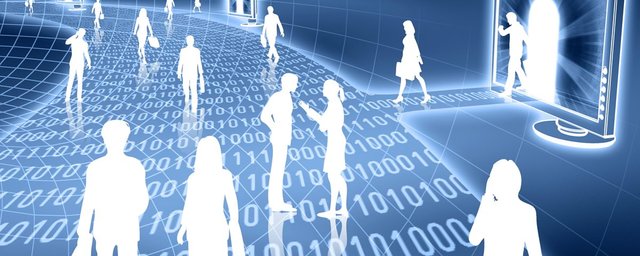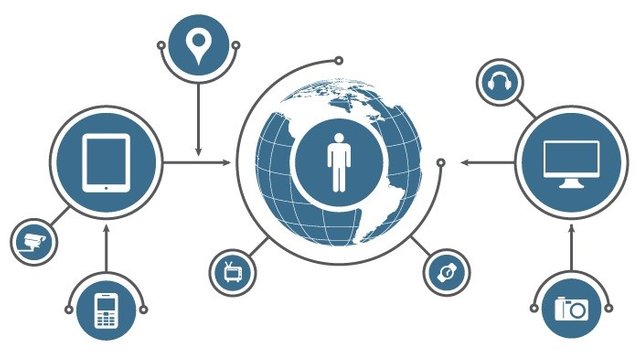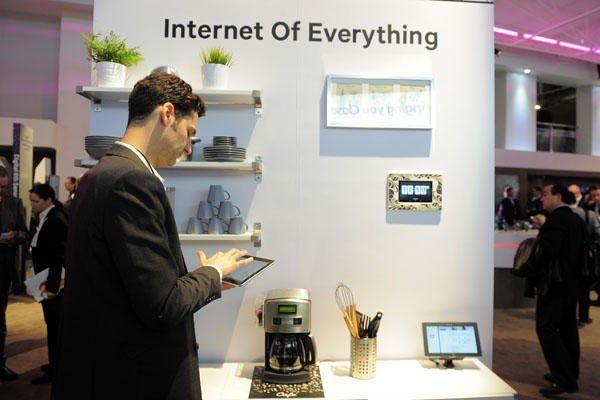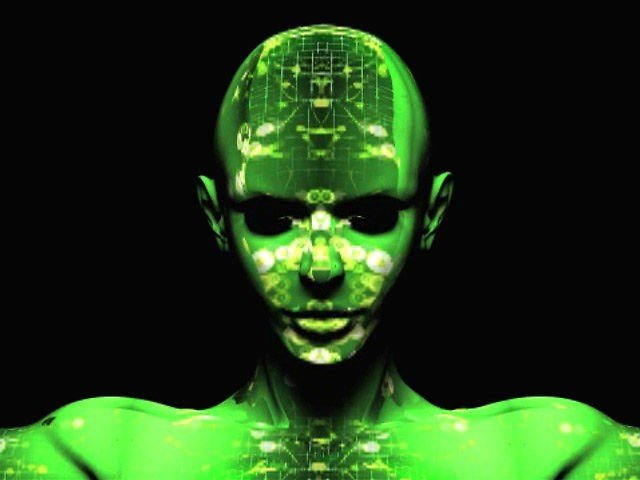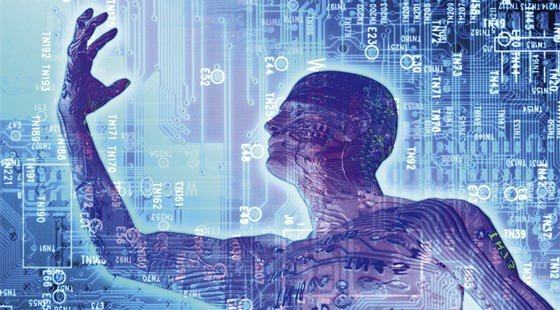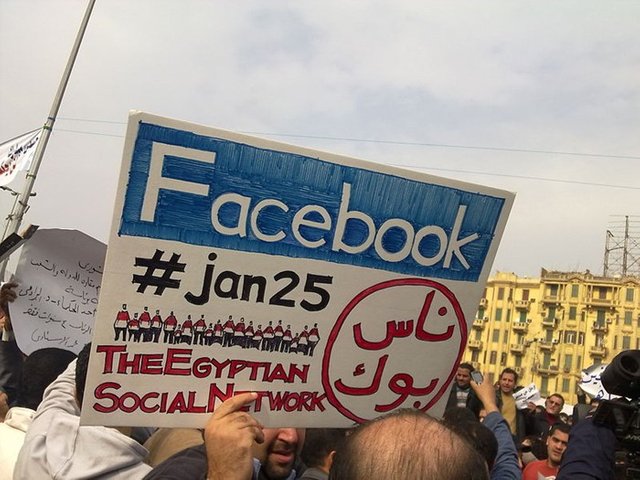The internet in 100 years
Hello, deciding it would be interesting as an exercise in imagination, both my own and our Steemers, think about how will be the future of the Internet, in 100 years. The network has been recognized as the most important invention of the last decades. In 25 years of commercial use, it radically changed the way the world works and has become increasingly integral in all of our lives.
This article does not claim to be a map for the future, far from it. We will be the first to recognize that the Internet itself 100 years from now will probably be replaced by another concept of more efficient, invisible and integrated network. Nevertheless, it is always interesting to think about the future and the possibilities it brings.
The ghost of Gutemberg
The historian Elizabeth Eisenstein, author of "The printing press of an agent of change" (the press as an agent of change), explains in his book that the invention of printing with movable type could only demonstrate all its transformative impact at least 100 years after that first impression was made by Gutenberg in the small town of Mainz. The books themselves, in its modern form, it would take at least 50 years to emerge.
Try to estimate how will the internet in 100 years is a similar task to ask the citizens of Mainz, in 1474, decided to infer what would be the future of the printing press? Would they be able to say that the invention would be used to destroy the power of the Catholic Church throughout the German Empire? This invention would give birth to the literature of the Renaissance and Reformation? The transformation in education and the very notion of culture?
A new Internet vision
In these early years of the Internet, our focus has been the transmission of content from a distance. Although this is an extremely important aspect of which is the network, it certainly will not be his only definer as we move toward a more connected future.
According to Dr. Astro Teller, Google's communications director, today "we see the Internet as if it were a place to which we will and that is actually nowhere. In the future the Internet will no longer be a place or a thing to become an infrastructure that supports every aspect of our lives. Every glass you take, every knob you open will know who you are and will respond appropriately. We will see the internet just as the "force" [Star Wars], that is, something that surrounds us and permeates our physical world, and not as the ethereal and separate place we visited today. "
The world will live internet.
Another thing that should be changed over the coming years is the concern with the inclusion of more people to the internet. There are several movements for organizations such as the UN put the network access as a fundamental right of human beings. Achieving this goal, that is, connect to all will be a revolution of massive proportions. Currently, only 2 of the 7 billion people connect daily to the internet, and that number has slowed its growth, which is currently only 9%.
The diversity of perspectives from all different parts of the globe, interacting and dealing with problems jointly, can bring even more changes than we expect today. Especially in the social field, as it will be easier to understand many of the difficulties that certain people go through when they even have the conditions to forward their problems to everyone.
One of the main focuses of the internet is its operation as a collaborative tool. As Wikipedia is final product of what this means in terms of content, when the network is more than it can see collaboration and interaction in other spheres radically new. The combination of different forms of entertainment, building certain thing done by people in different parts of the world, and many other collaborative innovation.
The Internet of Things
According to the Pew Reasearch Center, 83% of US technology experts believe that the concept called "Internet of Things" (Internet of Things) will become a general trend in our daily lives until 2025. For those unaware the concept, it implies that all devices, objects and systems will be connected to the internet and each other in the future.
Ten years ago, most homes had only one device with the ability to connect to the internet: personal computers. Today, this figure has multiplied exponentially. A home of a middle-class person in a large city has on average: a laptop, a tablet, a phone, smart TV, a media center, a video game and sometimes even other devices with internet connection. That is, there was a significant increase in this regard and the trend is that it will become increasingly common.
A smart refrigerator that is almost on the market
Since wearables in our body to coffeemakers and toasters smart, everything must be on the network exchanging data and information to make our lives more comfortable. These devices reinforce, once again, the trend that the Internet will no longer be a place and become more like an invisible structure that facilitates our daily life.
Entering the house of the future
In the future, different tools and sensors will be in our body in the form of wearables. They warn your home when, how and under what conditions you are coming. If it's a hot day, as you approach your destination the system responsible for the cooling of your apartment will enable leaving it at its ideal temperature. The lights also ascend and adjust to their predetermined preferences.
If you like listening to music when it arrives, the stereo will turn on and choose the right songs at the moment. It will be based on your current state of tiredness, nervousness, anxiety and other psychological states which will be measured by a chip in some part of your body.
All local devices will have internet in some instance
If you are hungry, your refrigerator has an interface (which in 100 years can be controlled by your head, but that will soon be a touchscreen) that already tells you all you have it. In addition, the device will suggest what kinds of foods can be prepared at the time, based on your dietary history, diet and what you ate for lunch.
To sit on the couch and turn on an entertainment device, be it a screen, an eBook, a hologram, a video game etc. The lights will adjust again to a more appropriate standard to this activity, the sound off and you can quickly choose a content between a small group of selections made especially to suit your tastes. If you do not want any of them, you can search through a simple command something that fits your current mood.
The next Internet revolution is not only it becomes a conscious structure of sensors and algorithms that pervade everything around them, but also have the ability of such data to provide for what you want or what you need even before you.
We are one with the network: transhumanism
It is impossible to discuss the implications of the internet in the future without also think of transhumanism. This concept, increasingly present and important for futurists and philosophers who think in future talks about a time when we will be able to use technology to overcome the basic human condition, that is, we are not talking here only of cyber implements, but also biotechnology, Neuro and even nanotechnology.
The term was coined in the 50s, but assumed its present form through the writings of the philosopher Max More. For him, "transhumanism is the class of philosophies that seek to guide us to a post-human condition. It includes many humanism elements such as respect for reason and science, the commitment for progress, and the enhancement of human existence ( or transhuman) in life [...], but differs in recognizing and anticipating radical changes in the nature and possibilities of our lives resulting from various sciences and technologies. "
The future of man is internalizing the internet?
Objectively, transhumanists aim to increase understanding and human capabilities beyond the indefinite extension of our lifetime through technologies for aging elimination, seeking immortality. It is impossible not to think about the implications of the evolution of the Internet will have these advances when we think that within a few years we will be implemented by accessories able to connect to it.
From a neural standpoint, it is very possible that in 100 years we will be able not only to receive the network's content in our heads as well as to expand our mental faculties from this integration. Of course, there are inherent risks to connect our brain to such an open network and the internet, but it is likely that new forms of encryption and security appear there.
Even if discard the wilder claims of transhumanism, it is still true that our body as a whole will be monitored all the time by mechanisms connected to the network. Today, there are already companies dedicated to creating wearables measuring their health condition every moment as well as their level of stress and this trend should really grow in the coming years.
What are the limits for transhumanism?
Also, there are different bodily implants that become every day more useful and functional and that in the future, certainly also have access to the internet. The success of these implants will probably do that even people without any disability choose to use them to enhance certain characteristics of your body, thus overcoming the human condition.
The Internet and political revolution
The social and political field, the rapid growth of the internet has led our company to a new level, in which globalization takes a communicational-informational character. As access to the network is increasing, creating virtual communities and social networks also grows, also resulting in the growth of "instant social movements" in which we can put the protests.
Recently, in different countries, including Brazil, an unsatisfied mass made use of new technologies and social media to summon the people to the streets and protest together against the government. Twitter was used to mark the meetings by activists and to disseminate information about the protest. Facebook was used for debates, dissemination of local and time of the protests, photos etc. YouTube served as videos tool storage and to publicize local events to the world.
In the case of North African dictatorships, the response of governments that were being addressed could not be clearer. Both in Egypt and in Libya, they decided to cut off access to the Internet, thus preventing the people to organize. This attitude shows how important was the presence of the web and social networks as a planning tool in that region. Try to stop the revolutionary process by blocking the internet in an entire country illustrates the power that this tool has the democratic movements in the region.
The Arab Spring could have happened without Facebook?
In the future, the internet remains a free space and without the direct interference of governments and companies regarding the contents of the network, these relations should only intensify. It already regulates the social life of virtually all of its younger users, so it is likely that our lives and political actions also come to be associated with the network, which is currently recognized by contemporary politicians as one of the most important battlefields of a campaign .
The internet also has the ability to recreate, for the first time since the fall of Athens, a truly participatory democracy for its citizens. If efficient security mechanisms are created, you can extend plebiscites, votes and other forms of political participation to the whole population with the use of the tool. Surely this is a matter that should be achieved with a lot of struggle in the political field, since hardly a government will relinquish its current form of control to a more democratic and transparent system.
The very transparency is another thing that can be achieved with the internet, which has the ability to create sites with public budgets updated in real time, a formidable anti-corruption tool. The almost inevitable end of privacy can also mean a time for more honesty in politics, at least in relation to the target taxes and other similar funds, since it is difficult to predict the external sources of bribery. The truth is that the current technology already give account to solve this problem, what is missing is revindication and will of the government.
The future may also bring bad things
Not only positive forecasts that the future is done, and not every technological development inherently serves good purposes. For John Markoff, the specialist technology of the New York Times, in the future you can answer the phone thinking it's your mother or a friend on the other side of the line when it's a smart malware designed to collect personal data or you to transfer money to a shady place.
The problems are not limited to new types of viruses and hacks that can be developed, but also to those who have control of the network. For the Internet to function well, it needs to remain in a very difficult balance: governments can not control it and should keep clear laws that prevent companies from abusing on their services as providers. This is the much debated issue of net neutrality, which has been threatened by several companies interested in profit most from the tool.
conclusions
usionsYou can not reach definitive conclusions about how the network will be in 100 years. However, many of the hypotheses throughout this article seem to be ways "safe" that could become a reality over time. No matter how good at predicting the future we think that we are the "Gutemberg ghost" will always be there to prove us wrong.
Thank you for reading this far. If you liked upvote >> :)))
